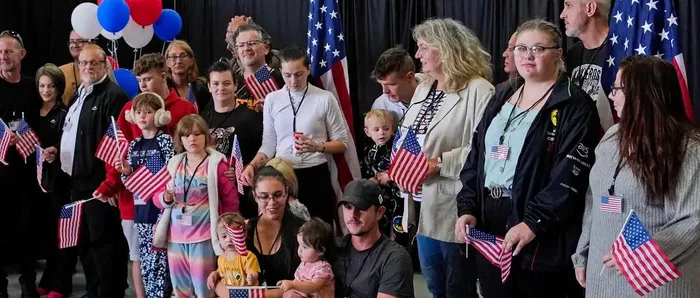Forget about persecution, greener pastures could have led some Afrikaners to move to US
They are opportunists'

White South Africans arrived in Washington last month as "refugees". They are simply opportunists grabbing an opportunity provided by Trump to migrate to the US.
Image: AFP
Many South Africans, in particular Afrikaners, have been moving to the United States under President Donald Trump’s “South African refugee program” in what he says is meant to protect the persecuted white minorities.
However, new revelations suggest that some migrants may have exploited U.S. immigration policies, not out of genuine risk, but in pursuit of improved economic opportunities.
One such case is that of Lucinda Trigard, a former IT support consultant from Centurion, South Africa. Trigard recently put her house up for sale after struggling to find a management job in the U.S. However, in her original refugee application under the Trump-era Executive Order 14204, she claimed she feared for her life due to “farm killings” and so-called “white genocide” in South Africa.
This executive order allows South Africans to apply for refugee status under three conditions: being of South African nationality, being of Afrikaner ethnicity or another minority group, and having suffered or fearing future persecution. While Trigard met the first two requirements, her claim of persecution is now being questioned.
She has no history of farming — one of the key reasons often cited in these claims — and experts argue there is no evidence of a “white genocide” in South Africa.
Some Afrikaners have used the refugee route to fast-track immigration to the US. This has led to criticism from South African farmers and researchers who argue that many of these applicants are not actually victims. Nick Serfontein, a well-known white commercial farmer, criticised the trend, saying: “They are opportunists.”
He added that these individuals are not genuine farmers, and many are simply using the label of “persecution” to leave South Africa.
Denile Samuel of the Women on Farms Project shared a similar view.
Speaking to Newzroom Afrika, she said: “The real people who are marginalised, the real people who are not heard and not seen, are farm workers. They are the ones who need to complain, not white Afrikaners.”
Granite mining businessman Charl Kleinhaus has come under fire for calling himself a “refugee.” Images of him have circulated online, sparking debate about whether such individuals truly qualify for refugee status.
Meanwhile, Professor Roger Southall of the University of the Witwatersrand argued that many of these Afrikaners are simply trying to bypass normal immigration hurdles. In an op-ed, he wrote that emigrating legally requires education, financial resources, and job offers — things many applicants lack. “They are using a shortcut,” he said.
Despite the backlash, some say the issue isn’t so black and white. Jaco Kleynhans, a spokesperson for the Solidarity Movement, defended those leaving, claiming that poor job prospects and economic pressures have driven many Afrikaners to emigrate. “20% of Afrikaners have already left the country permanently or temporarily because they could not find work,” he posted online.
